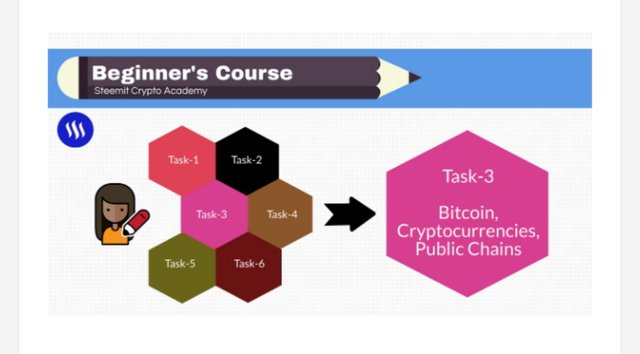Crypto Academy season3 Beginners' Course-Task3:Bitcoin,Cryptocurrencies,Public Chains by @stream4u
Hello cryptoworld,
I am very excited to be among the participants of this season 3. It is looking interesting.
Special thanks to @stream4u for his wonderful,straightforward and simple lecture. I always yearn for your lecture,and i am always eager to participate in your Homework task. Thank you for all the good works. Big thumbs up.
I will be answering question number 3
(3) What Is Public Chain and What will be the Advantages and Disadvantages of Public Chain?

what is public chain?
A public chain is a decentralized platform that is open to the whole public. To put it another way, it is permissionless, which means that anyone can join, write, and read the data on the platform.
A public chain has eliminated the need for a third party.
The system has its own natural flow, similar to a flowing river. Despite the fact that no one has control over the flow channel, everyone uses it. It's a digital public ledger that's self-governing, completely decentralized, and autonomous.
How does it work?
You can download the protocol at any time in a public chain architecture, and you won't require anyone's permission. Public chains represent the ideal model that has made the IT industry so profitable.
For transaction validation, this network typically employs Proof of Work or Proof of Stake consensus techniques.
Public chain examples
Bitcoin, and Ethereum, are the two most popular public chains.
The proof-of-work (PoW) consensus process is used by Bitcoin and Ethereum. Ethereum, on the other hand, has begun the move to a proof-of-stake (PoS) consensus method.
Characteristics
- Every node has read and write access to the ledger.
- Anyone can download the system and add nodes to it.
- The technology is completely decentralized
- it provides anonymity, meaning no one can trace your transactions back to you
- it is a little slower than private chain.
ADVANTAGES
Immutability
The public network cannot be changed in any way. This means that no one can hack the system or take the funds. If someone tries to tamper with the blocks, such as by double spending, the transaction will be rejected by all other nodes. As a result, incidents such as tax fraud and a variety of other issues can be mitigated with this technology.Structure that is truly decentralized
The network infrastructure is decentralized to the nth degree. As a result, each node in the system will have its own copy of the ledger. They can also update the ledger quickly by employing consensus techniques.
This form of chain provides a genuinely decentralized structure because no central authority is required at any point.User Involvement
Anyone with access to the internet can download a copy of the chain and read or rewrite it with complete authority. In other words, the control panel is in the hands of the general public, not a wicked company.Transparency
In comparison to private networks, a public chain provides more transparency and is more decentralized because anybody may join and no single entity has authority over the entire system.
- security.
A public chain grows more secure as it becomes more decentralized and active. As the network grows in size, it becomes increasingly difficult for any form of attack to succeed. Malicious actors will find it nearly impossible to gather together and take control of the network.
Disadvantages
• it is relatively slow
• it is limited to only few consensus mechanism
• high energy consumption
Conclusion
Despite its shortcomings, a public chain would be the ideal option because it allows users to access without requiring permission from any server, it's decentralized, which improves security and transparency, and it takes local coins.
cc;
@stream4u